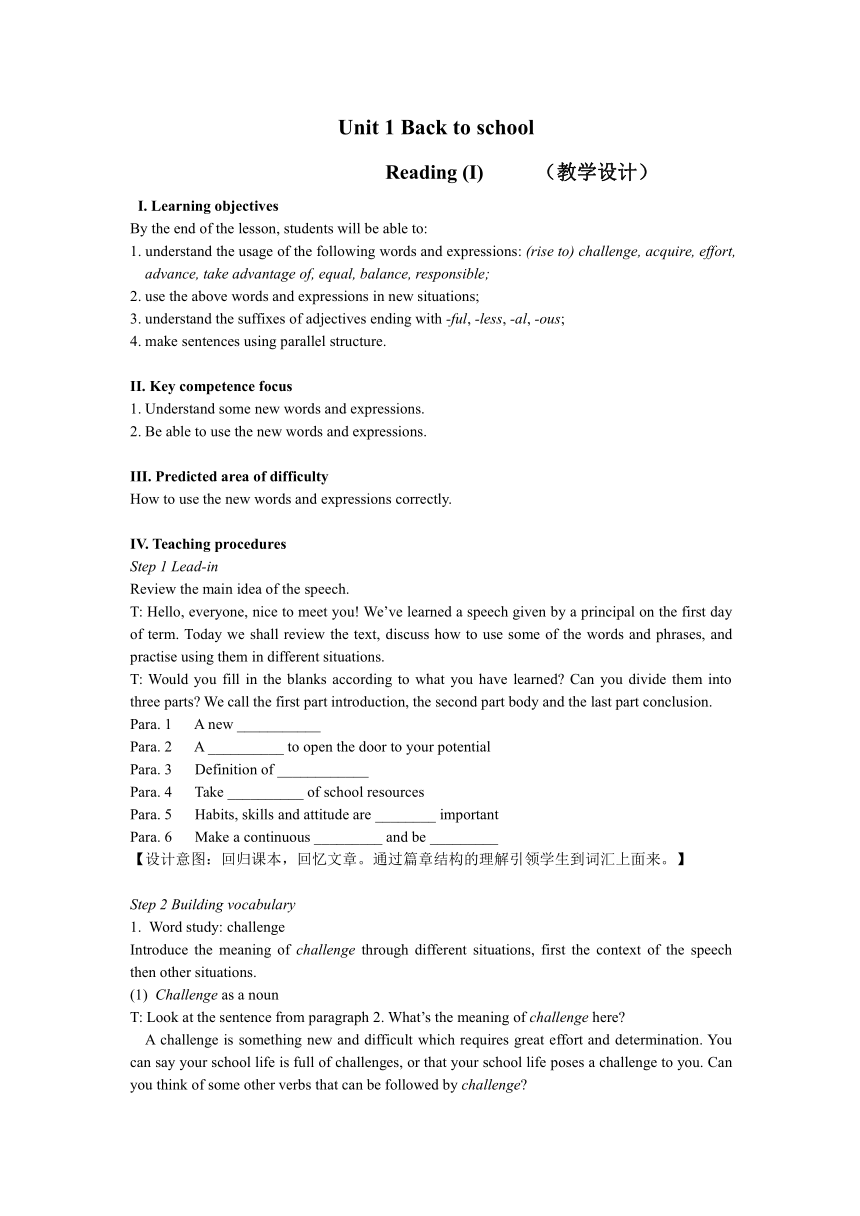
Unit 1 Back to school Reading (I) (教学设计) I. Learning objectives By the end of the lesson, students will be able to: 1. understand the usage of the following words and expressions: (rise to) challenge, acquire, effort, advance, take advantage of, equal, balance, responsible; 2. use the above words and expressions in new situations; 3. understand the suffixes of adjectives ending with -ful, -less, -al, -ous; 4. make sentences using parallel structure. II. Key competence focus 1. Understand some new words and expressions. 2. Be able to use the new words and expressions. III. Predicted area of difficulty How to use the new words and expressions correctly. IV. Teaching procedures Step 1 Lead-in Review the main idea of the speech. T: Hello, everyone, nice to meet you! We’ve learned a speech given by a principal on the first day of term. Today we shall review the text, discuss how to use some of the words and phrases, and practise using them in different situations. T: Would you fill in the blanks according to what you have learned Can you divide them into three parts We call the first part introduction, the second part body and the last part conclusion. Para. 1 A new _____ Para. 2 A _____ to open the door to your potential Para. 3 Definition of _____ Para. 4 Take _____ of school resources Para. 5 Habits, skills and attitude are _____ important Para. 6 Make a continuous _____ and be _____ 【设计意图:回归课本,回忆文章。通过篇章结构的理解引领学生到词汇上面来。】 Step 2 Building vocabulary Word study: challenge Introduce the meaning of challenge through different situations, first the context of the speech then other situations. Challenge as a noun T: Look at the sentence from paragraph 2. What’s the meaning of challenge here A challenge is something new and difficult which requires great effort and determination. You can say your school life is full of challenges, or that your school life poses a challenge to you. Can you think of some other verbs that can be followed by challenge Think about the situation: if the workers are not paid on time, they will go on a strike. Can you translate the sentence: 罢工给政府带来了严峻的挑战。 Collocations of challenge T: Since challenges do exist. People have to face them, right You can also take on or accept them. That means you are ready to deal with the challenges. Then if you can successfully deal with them, you are able to meet them or rise to them. Would you please read the following two sentences together Free talk: ask students to summarize different collocations of challenge and understand them in different contexts. Challenge as a verb T: Challenge can also be used as a verb. If you challenge someone, you invite them to fight or compete with you in some way. For example, 迈克要挑战我跟我下棋。How do you translate it into English As we know, nowadays, the relationship between parents and children is not like that of many years ago. Children challenge their parents’ authority (权威) far more nowadays ... ...
~~ 您好,已阅读到文档的结尾了 ~~

